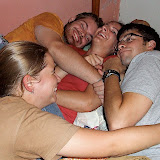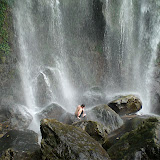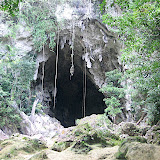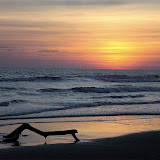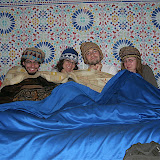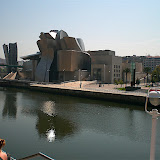Un Mes
So, everyone, I’ve been here for a month, and it’s been quite the experience.
This weekend, as you’ve probably read, I elected to stay here instead of going away for another amazing hiking place, which I’ll probably do later this semester. I needed some time to recollect my thoughts, to write this stuff, and to see the city for what it’s worth. The Mercado was an incredible experience, and I needed to understand what San Salvador was like, even though I still have very little comprehension of where things are in relation to each other. It’s weird living in a developing city, where there’s really no tourism industry and where there’s excessive levels of violence. For a person who loves cities and loves that type of exploring the urban environment, it’s rather frustrating with no reliable/understandable system of public transportation and an unsafe space to explore. Furthermore, from what I understand, there isn’t too much for us to see or do in San Salvador. So, even though I feel like I’m stranded here on the outskirts of the city and that we have an arduous daily routine, there really isn’t that much to do here, which is very sad.
It’s a land of incredibly opposite forces pulling at each other: the natural beauty and the human sadness; the North American chains and tiny pupuserias and comedors; the huge, lavish malls that rival some of ours back home and the tin houses that still exist from former refugee camps.
My praxis site is going well, though I have hope for how things will change in the future. I feel right now like I’m just coasting along, happily and naively there in Mariona, so I’m trying to find some other things that would satisfy some questions and desires of mine in terms of understanding the community.
Classes are just okay, really, but I have hope for some of their improvement over time. A couple, like Poly Sci and Literature, are delightful right now, and I feel like I will continue to learn valuable things in those. Other classes have been slow to develop, but I feel that once we get going a little more, they will be just fine (or so I hope).
I miss everyone from home, everyone from school, from last semester, from other programs I’ve done and people I’ve gotten close to. It’s emotionally taxing here but necessary. Community living, as I thought beforehand, is very difficult. Living with 12 other people in one house with common food and responsibilities can be very stressful, as you can imagine. Regardless, I have some great friends on whom I can rely and with whom I’ve become close. This experience forces you to rely on other people who can understand what you’re going through, what you’ve seen, what El Salvador is doing inside you.
I look forward to another three months, that are only bound to get harder and easier in many ways, but that are bound to affect me profoundly. I hope and pray that Salvador will change me.
It's tough, but I came in knowing that. It's meant to be tough. It's what I asked for. But it's good, and it's what I need at this point, and it's where I'm supposed to be.
I hope that everyone stays warm back in the States and experiences God's blessings on you and your families. Paz y amor--
AMDG,
Anthony
This weekend, as you’ve probably read, I elected to stay here instead of going away for another amazing hiking place, which I’ll probably do later this semester. I needed some time to recollect my thoughts, to write this stuff, and to see the city for what it’s worth. The Mercado was an incredible experience, and I needed to understand what San Salvador was like, even though I still have very little comprehension of where things are in relation to each other. It’s weird living in a developing city, where there’s really no tourism industry and where there’s excessive levels of violence. For a person who loves cities and loves that type of exploring the urban environment, it’s rather frustrating with no reliable/understandable system of public transportation and an unsafe space to explore. Furthermore, from what I understand, there isn’t too much for us to see or do in San Salvador. So, even though I feel like I’m stranded here on the outskirts of the city and that we have an arduous daily routine, there really isn’t that much to do here, which is very sad.
It’s a land of incredibly opposite forces pulling at each other: the natural beauty and the human sadness; the North American chains and tiny pupuserias and comedors; the huge, lavish malls that rival some of ours back home and the tin houses that still exist from former refugee camps.
My praxis site is going well, though I have hope for how things will change in the future. I feel right now like I’m just coasting along, happily and naively there in Mariona, so I’m trying to find some other things that would satisfy some questions and desires of mine in terms of understanding the community.
Classes are just okay, really, but I have hope for some of their improvement over time. A couple, like Poly Sci and Literature, are delightful right now, and I feel like I will continue to learn valuable things in those. Other classes have been slow to develop, but I feel that once we get going a little more, they will be just fine (or so I hope).
I miss everyone from home, everyone from school, from last semester, from other programs I’ve done and people I’ve gotten close to. It’s emotionally taxing here but necessary. Community living, as I thought beforehand, is very difficult. Living with 12 other people in one house with common food and responsibilities can be very stressful, as you can imagine. Regardless, I have some great friends on whom I can rely and with whom I’ve become close. This experience forces you to rely on other people who can understand what you’re going through, what you’ve seen, what El Salvador is doing inside you.
I look forward to another three months, that are only bound to get harder and easier in many ways, but that are bound to affect me profoundly. I hope and pray that Salvador will change me.
It's tough, but I came in knowing that. It's meant to be tough. It's what I asked for. But it's good, and it's what I need at this point, and it's where I'm supposed to be.
I hope that everyone stays warm back in the States and experiences God's blessings on you and your families. Paz y amor--
AMDG,
Anthony
